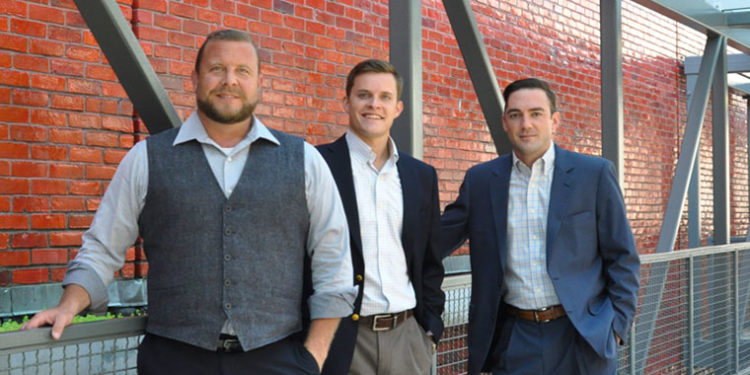UTRF Interns Q&A

Where are you from originally?
Kevin: I grew up in Wartburg, TN, but moved away immediately after high-school. After moving around the country quite a bit, I settled in Chattanooga, TN and made my home there before coming to UT Law.
Shane: Louisville, KY
Tyler: I am from Murfreesboro, but I have lived in Knoxville since 2005.
Why did you choose UT?
Kevin: It was the obvious choice. It’s the state’s flagship law school, in-state tuition is a bargain compared to other schools, and no other school has the Vols.
Shane: Selecting a grad school was a difficult decision. While attending undergrad at Vanderbilt, I developed an undeniable fondness for the state of Tennessee, which in turn, led to a growing desire to begin my career here. UT’s expansive network of professional alumni stood out as an obvious employment advantage within the state. Ultimately, however, the deciding factor was financial. After evaluating the costs and likely benefits among several schools, I determined that UT could provide me with the highest educational value for my dollar. Also, the recently updated law and business school facilities, UT’s affiliation with the Southeastern Conference, and Knoxville’s vibrant social scene were a few other considerations that impacted my decision.
Tyler: I have been involved in the Knoxville community since I moved here for college. During law school, and later in private practice, I also became very active in the local bar. When I decided to pursue an MBA, I was at a point in my career where staying in Knoxville made sense. As a UT alumnus, I also knew the MBA program at the Haslam College of Business was a good investment.
What year and with what degree do you plan to graduate?
Kevin: I will graduate with a J.D. in May of 2016.
Shane: I will graduate in May of 2017 with my Juris Doctorate and Master of Business Administration.
Tyler: I will graduate in 2016 with an MBA with a concentration in finance.
Why did you choose to intern with UTRF?
Kevin: It paired perfectly with my interest in tech transfer.
Shane: (2nd year UTRF Intern) At UTRF the nature of our work is a sort of disciplined exploration, with emphasis on discovering promising potential and delivering individualized results. Throughout the exploration, we repeatedly tackle unique intellectual challenges spanning numerous practice areas and schools of thought. For instance, I typically work on a few technologies each day researching, writing and communicating my findings to my colleagues and/or the inventor(s). Specifically, on the initial front-end of technology disclosures, we conduct robust prior art screenings and patentability assessments as well as preliminary company/industry analyses. We then fine-tune our findings and provide the inventor(s) with detailed feedback. On the back-end, once the relevant IP decisions are made (i.e., whether to file for patent(s), copyright, etc.), we may expand on our preliminary research and conduct extensive marketing outreaches to, hopefully, capitalize on any commercialization potential. At this point, as we enter into discussions with companies for licensing agreements and contracts, my role transitions into one of a facilitator/negotiator. I particularly enjoy these interactive components of my job because they grant me opportunities to communicate with brilliant inventors and powerful executives in cutting-edge industries.
Tyler: In private practice, I represented entrepreneurs and small businesses in various transactions. As an MBA candidate, I chose the Commercialization Analyst Program so that I could continue to utilize my legal skill set while gaining meaningful business experience. In addition to intellectual property and licensing, I have gained valuable experience in market and industry analysis.
How did you become interested in tech transfer?
Kevin: I never understood Luddites. I love technological advancement. Make technological advancements; monetize those advancements. Life gets easier and the economy grows, if properly handled. If we don’t commercialize the results of government funded research, we’re not reaching our full potential. Before Bayh-Dole, the United States government held some 28,000 patents, and had licensed less than 5% of those for commercial use. That means no one was using the other 95% to make life better, to make money, or to create jobs. Bayh-Dole changed the IP landscape, and federally funded research can now be licensed through tech transfer offices. Tech transfer is the tool with which we commercialize research. The idea of being a part of that excites me.
Shane: All things considered, I am most excited by the prospect of learning about novel technologies and contributing to their commercial development from the lab/incubator to the marketplace
Tyler: Tech transfer overlaps in many areas with law and business.
What do you hope to be doing after graduation?
Kevin: Immediately after graduation, I hope to spend a few days on a beach somewhere. After that, I intend to spend time studying for, and passing, the bar exam. I’d like to find a job in the IP field, like tech transfer, or in the fields of bankruptcy or business litigation. Basically, I’m going to grind the grist that’s put before me, but those are the grists that I would prefer.
Shane: I hope to practice corporate law.
Tyler: My goal is to obtain an in-house counsel position with a financial institution or private equity firm.
What are your interests outside of school/work?
Kevin: My wife, Tiffany, and I like to hike in the Smokies; we like to take our dogs places where they can play. I previously rowed with the UT Crew, and would like to do it again, if my schedule allows. And, I currently enjoy picking up heavy things, putting them down, and picking them up again, whenever I get a chance.
Shane: I enjoy going to the movies, spending time outdoors, and playing sports with friends. And recently, I have been learning to play the guitar.
Tyler: I enjoy boating, golfing, and UT athletics.